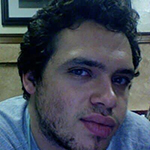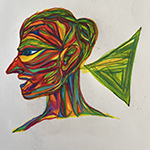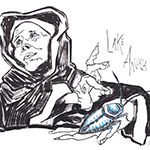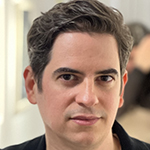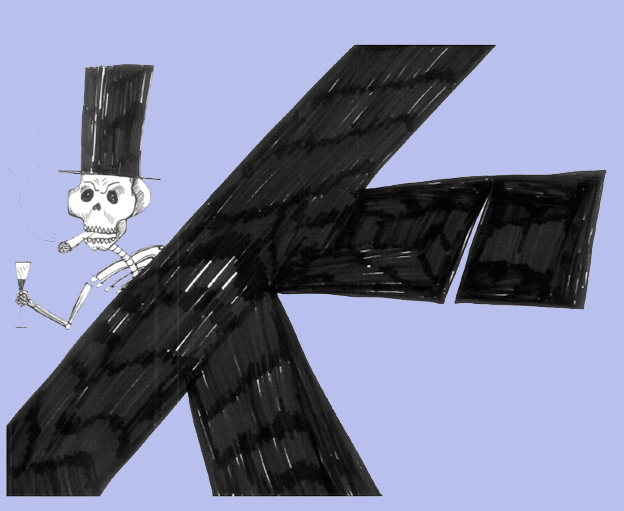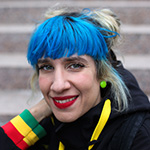Inside>Outside
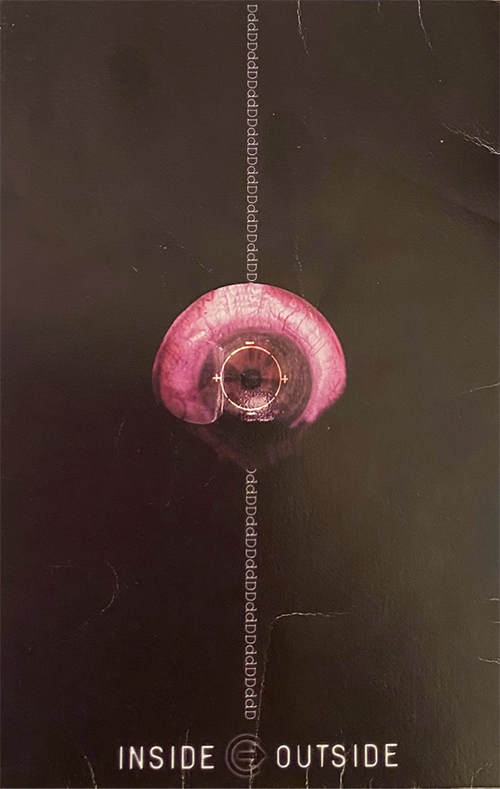
A wall of glass doors opens into this room. Eight possible entrances, eight possible exits. You are entering. The portal opens to music that sucks you in.
B C G
B C G
The notes repeat like waves, the seventh one the highest, the one you ride out on, your body washed by smooth water. But this wave never crashes onto shore. There is no shore.
You can feel wind blowing lightly even though you are inside. Inside Outside. You are back inside your mother’s womb. You are growing inside her. You are becoming. You are coming out into the light. You are upside down. You cry your first cry. You smile your first smile. You take your first steps on the wet sand by the ocean. You are learning your first words. You are reading your first book: Inside, Outside, Upside Down.
4. What Is Art?
($90)
What is art? Art is what you make of it. Are we art? Yes, we are made. Is art art? What kind of question is that? Where art thou o’ Romeo? You’re remembering it wrong. The line is “O Romeo, Romeo, wherefore art thou Romeo.” He will be your art. If you can find him. You have found him, but he’s not who you thought he would be.
6. The Logarithmic or Equiangular Spiral
($90)
What? You move on to the next piece.
Or do you? Have you ever even moved on from anything? You always cling to the past. You don’t even remember what this piece looked like, what it was. You imagine it was a red and blue swirling spiral, going down down down. Or was it up? You stopped taking math decades ago. You almost failed high school Physics.
10. Dancers
($90)
Dancers dance. Plié. Dancers. Tour jeté. Stretch your neck. Relevé. Lower your shoulders. Relevé. Curve your fingertips. Relevé. Point your toes. Extend your leg. Arabesque. Keep your heels together. 1st through 5th positions and you are in 7th. You create your own steps. You invented toes. Relevé en pointe. You don’t have any knees so you don’t have to bend. Plié. You have always been a dancer. You will always dance.
12. We All Come From Others
($1900) Acrylics on canvas
You know this. You’ve seen it before. But now you know.
Do you though? Do you really know? Do you really know anything at all? You don’t remember this one either. You were trying to be deep and philosophical. Stop trying to be so deep and philosophical. Just write this down as it happens, as you see it. Describe every last detail, every moment. What does it look like to come from another? Is it a messy birth, or a graceful death? What came first, the chicken or the egg? You remember this joke: a chicken and egg have sex, and after they finish, the egg sits there, satisfied and smoking a cigarette. “Well, that answers that question,” he says. Hahaha.
You think that ‘cigarette’ is probably the most beautiful word you know. You don’t know why, but when you hear someone sing that word in a song, you shiver with delight. You get goosebumps and the hair on the back of your neck stands up. Your mother recently told you that she hates stream of consciousness writing. She said, “Get a grip, and get an editor.” Whatever. You keep writing whatever you want. Even though she’s the person you came from, she doesn’t understand you.
23. Always Remember How
($190)
She is pregnant. See the baby? Its body, within her body, is circled in red on the black & white film. One hand supporting her back, another resting on her belly. Always remember how.
You have never been pregnant, except in your dreams. You’ve never felt a baby move within you. How can you then remember how, if you’ve never felt this? The sonograms you have in a box on a shelf are from someone else’s body. You remember hearing his tiny heartbeat, steady and strong. Maybe you can remember how.
B C G
Remember these notes. Remember how to play them. Feel your fingers stretch along the keys. Feel the sound. If you remember these notes, they cannot be taken away from you. You’ve since forgotten. You even got these notes wrong. You did not remember. Yet, they remain. They were not taken away from you. You play them with your fingers in the silent air. You still hear them in your head, in your heart. They are faint, but they are there. They will always be there.
25. Trying to Know One Another
($190)
You have been filmed. This is a movie of you and the people you have touched. You have touched so many. To touch is to know. Can you really know anyone? There is no color. Yes, there is. Color is not necessary for knowing. Yes, it is. You only need light to know who you have touched in the night. You need so much more than that. If you could choose an eye color, it would be amethyst. It is your birthstone. Your eyes are blue-gray-green, like the Atlantic Ocean. His would be the same as they always or never were, only open more. His eyes were bright blue. They all had blue eyes. But the eyes you look into now are a warm brown, like coffee, like maple syrup. You are still trying to know one another, even after all these years.
39. Red (Vision Channel Device)
Plexiglass. $410
Use your Vision Channel Device. You’ve lost yours. You’ve lost this. You choose to illuminate. You stopped choosing to illuminate. You instead chose to live in darkness. Leave the potential of light hanging by a cord, or squeeze it to shine on the paintings before you. Your hands hurt when you squeeze things too tightly. You know that if you had to choose, you would lose your sight before you would lose your hearing. Red. Blue. Art should be hung. You could live without art, but you would die without music. Use your Vision. Your vision grows worse every day it seems. Channel. You are trying to channel your old self. Device. You look in the mirror, in the light, and you are becoming blurry.
44. Blue No. 5
($1200) Acrylic Gel Medium, Wood, Pigment
Twelve-hundred dollars. You could never afford this then. You can now, but it’s been too long, it’s gone. Acrylic Gel Medium, Wood, Pigment. If you were wood, you would be slender white poplar. You’ve lost your slender form. You will never get it back. You are now an oak tree, thick and sturdy. If you were a pigment, you would be blue. You can’t remember why you felt this way. Number 5 please, and supersize it to the sky. Yes, to the sky, always to the sky.
53. Growing Inside
($15,000)
The violins to the violas to the cellos, all lacking life—lacking strings. You can see this one. You remember the instruments, arranged by size and hanging from the ceiling, growing into one another, clearly. They are connected by a string. What is a cello without strings? It is nothing but hollow sound. You are a muse, trying to know one from the other. That night in the park, he said you were his muse. He played the guitar. It started to rain. He shielded his guitar with his body. He did not shield your body from the rain. Years before, you gave someone else your guitar that you could not play. He lost it. You never got it back. You will never get it back. You don’t want it back now. You are nobody’s muse. Size matters. Yes.
59. The Marriage of Art & Science
(Not for sale, Opening Night Only)
The video plays in slow-fast motion, clipped yet smooth. You don’t have this video anymore. Did you ever have it? The black limousine is in motion. There was no black limousine. So are the flowers flung backwards, floating through the air. You never threw your bouquet into the air. You kept it in your hands. You dried the orange roses and white calla lilies and kept them in a glass bowl until they got too dusty and brown, and then you threw them away. You stop and stare as she pauses to look over her shoulder and she is beautiful in white. You felt beautiful that day. She is posing for the ceremony. The photographer over-exposed the whole roll of your wedding ceremony. Why didn’t you insist on digital rather than film? She is beautiful in white. He is her shadow in black. His hair falls over his eyes. His hair is short—you have never brushed it out of his eyes. Everyone is beautiful in black and white. Yes. She is Art, he is Science. You are both Art. What happens to you now?
Stop ( [_] ). Rewind ( << ). Play ( > ).
60. See What We Saw
($190)
You want someone to see what you have seen. Yes. You want someone who understands the notes
B C G
He will never understand this. He will never understand you. Someone who hears it in his head, too, the keyboards pressing into the strings of the cello and the bowed bass. He cannot hear it. You hear more meaning in the soothing wordless vocals than all the songs on the radio. This is still true. You think to yourself, this is all connected. B is connected to C is connected to G until there is sound pulsing like a beating heart would beat if it didn’t have to beat so fast and so often.
Many years later, you forgot the notes. Or, you misremembered them. You thought it was B C D, repeating, until you used a piano app on your phone and realized you’d been wrong this whole time. You hum these notes to yourself from time to time. You yearn to play the piano once more. Your husband bought you a keyboard the Christmas of 2018, but now it gathers dust in the basement of your house. Maybe you don’t need him to understand you after all.
69. Me & Will
($190)
How could you have missed this one? I don’t know. You will create an image of your own instead, but you will keep the music. Always keep the music. Especially the cello pulling on strings which connect you to this room. You have always been connected to this room. It is a part of you. This is Me. Who am I? Where is Will? There is no Will. You were looking for the wrong one. How do you get the “&” that will bring you together? You won’t, at least not in the way you thought you would.
75. The Muse
($290) Chromatics on Cebachrome
She wears a red-draped gown. You had one once, too, but it was orange. The trees are blue. The trees are green. The sky is yellow. The sky is blue. The sun is green. The sun is yellow. It does not matter because the projected light fuses them all together. It does matter. The truth matters. You have lost your muse. You never had one. This one cost $290 and is made of Plexiglas and Cebachrome so it won’t shatter like yours did. They were all broken. You will take this muse with you and reflect it upon all of your blank white walls. You are your own muse. You cannot lose yourself. Your walls are no longer blank. You don’t believe in tabula rasa; you believe we are all born with innate ideas.
83.-98. This
Is
Who
We
Are
In
The
Day
This
Is
Who
We
Are
In
The
Night.
($120 each)
You laugh during the day. You hardly ever laugh. You cry during the night. You never cry anymore. Who are you? You are flat, but you are whole. You are alive. What happens at twilight? Twilight is when you feel the most alive. Nothing good happens after midnight. You could sleep all day if you let yourself.
101. Light Plant
($950) Flashlights, hosing, metal
Light plants do not need water. You need water. If you pour water on them, they will spark and rust and explode. You have been sparked, and you nearly exploded. Now, you are starting to rust. Light plants have curved blue metal branches and flower in red light bulbs. They don’t exist outside of this space. If you had a light plant, you would not miss green leaves at all. Yes, you would. Flashlights, hosing, metal. What are you made of? Flesh and bone.
1. She ($90) meets 78. He ($90)
He: Where is the art?
She: Inside, outside.
He: Did you see what I saw?
She: I remember.
He: (looking at 81. Black on White) This is who we are in the day.
She: (looking at 82. White on Black) This is who we are in the night.
He: Are you a dancer?
She: Yes, are you?
He: We can be, together, trying to know one another.
She: Touching?
He: Yes.
She: Me, Will. With an & in between.
He: It will be a marriage
She: of Art.
He: and Science.
100. Inside>Outside
You find an old postcard from an art exhibition. You take a step back in time to March 2000, your college spring break. You are She. Yes. You and He walk out of Paul McLean and DddD’s “Inside>Outside” show in the east gallery of the Parthenon in Nashville together, holding hands, fingers intertwined. You were alone. No, you were with one of your best friends, another She. Only he is entering and you are exiting. You never left. You left a piece of yourself there. You were never talking. You hear voices. It was only in your head. It was real. He is inside now. He never existed. Your heart is broken. So broken. You are outside. You are back inside. There will never be an &. Maybe this time there will be. Maybe this time.
B C G

Rachel Paris Wimer (she/her) is a writer and web content editor based out of the DC metro area, where she lives with her husband and son. She has a BA in English from Washington College and an MA in English from George Mason University. She is an alum of the Pioneer Valley Writers’ Workshop and the Tin House Summer 2022 Workshop. Rachel’s work has been published in Southeast Review, Under the Gum Tree, The ASP Bulletin, and elsewhere. She is currently working on a hybrid memoir. Rachel would like to thank the artist Paul McLean whose work inspired this piece. Find her on Twitter/X: @rachelwimer.

 BACK TO ISSUE
BACK TO ISSUE


